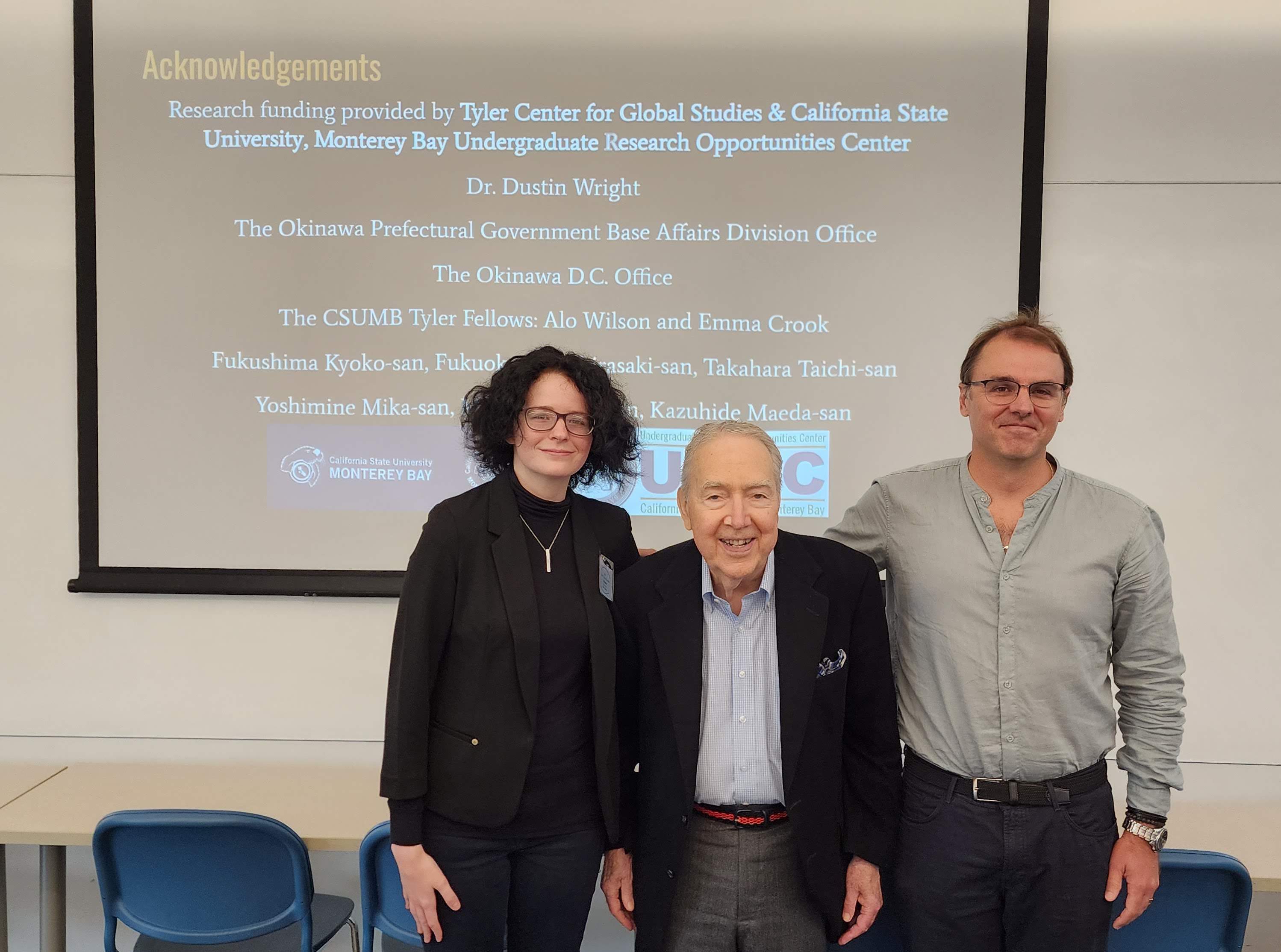World Languages and Cultures
Global Base Studies Project (GBSP)
The Global Base Studies Project, directed by Dr. Dustin Wright at California State University, Montrey Bay, conducts fieldwork and research on the social, political, and historical complexities of American military bases in Japan. CSUMB is the ideal institution for the Global Base Studies Project (GBSP). The campus sits on the site of the former Fort Ord, which during the twentieth century was among the largest military bases on the west coast. When the base closed in 1994, the surrounding communities suffered a significant economic and population decline, a clear indication of the role the base played in developing and sustaining communities
2023 Scholar Cohort
In 2023, the first cohort of GBSP Fellows will conduct field research in Japan related to the continued presence of military bases. Three students were selected to conduct research and fieldwork in Japan, supported by funding from the Tyler Center for Global Studies. Read more about their experiences as shared with UROC.
.jpg)
Mahler presents at Summer UROC
Levi Mahler presented initial findings at the UROC Summer Research Symposium on their work related to Dr. Dustin Wright's Global Base Studies Project (GBSP). The project included travel to Japan for two weeks that was supported through the Tyler Center for Global Studies. The research will be expanded upon during an October 2023 presentation event.

Background to GBSP
The U.S. maintains hundreds of military bases around the world. Military bases and nearby basetowns are complicated spaces. Local communities in “host nations'' often serve as “rest and relaxation” spaces for service-members. “Local nationals” often provide integral labor on military bases, including as maintenance personnel, interpreters, cooks, and clerical staff. Cultural interactions, the sharing of music and foods, sports and films, can often serve as non-threatening experiences in these cultural “contact zones” (to draw from the scholar Mary Louise Pratt). While media reportage and scholarly work on bases tends to focus on geopolitical strategy and national security, the GBSP hopes to understand bases in a more intimate way. Only rarely does America’s massive global base presence enter the national conversation, often only momentous events like the withdrawal of U.S. armed forces from Afghanistan in 2021 or military accidents like the Cavalese crash in 1998, when 20 people fell to their deaths after a US jet from an Italian base sliced a gondola cable. While most Americans do not frequently engage with the country’s global base presence, the same cannot be said for those communities around military bases in “host” nations.
GBSP Faculty
The faculty director for this program is CSUMB Associate Professor Dustin Wright, a historian of Japan. For the last fifteen years, Wright has been researching the history and impact of U.S. military bases in Japan, which have dotted the landscape there since the end of World War II. Wright wrote his PhD dissertation (UC Santa Cruz, 2015) on the history of anti-military base protests in western Tokyo and is currently writing a book (to be published by Stanford University Press) on the history of anti-base protests throughout Japan. Wright is also the Associate Director of the Okinawa Memories Initiative, a public history project. For more about Dustin, please see his website.
Related Projects and Resources
CSUMB also explores areas related to GBSP including:
- Okinawa Memories Initiative (OMI): The Okinawa Memories Initiative is a community history and dialogue project focusing on Okinawa and all the ways that its people, culture, and crises are central to understanding the world today.
- Farr Legacy: CSUMB Archives and Special Collections houses the Sam Farr Papers. Congressman Farr played a major role in securing millions of dollars of funding and nearly 14,000 acres of the former Fort Ord in order to develop a university on the former Army base, which would eventually become CSUMB.
- WLC Special Topics: An eight-student cohort worked to catalog and create an inventory of the files of the late political scientist Chalmers Johnson (professor emeritus of UC Berkeley and UC San Diego). Johnson was a scholar of Japan and China and was a self-professed “cold warrior” who, in addition to his academic work, served as CIA consultant during the Vietnam era. After he retired in the early 1990s, and after the dissolution of the Soviet Union, Johnson began to question the need for the United States to maintain such a large foreign base presence. He wrote a bestselling trilogy of books that focused on “blowback” and the unintended consequences of America’s “empire of bases.” With collaboration and training from CSUMB Archives Specialist Robin Guthrie, Wright’s class worked with several boxes of correspondence, news material and activist records related to a deeply contentious anti-base movement that erupted in Okinawa in 1995, after a thirteen year-old girl was raped by three American servicemen. The assault triggered a turning point in U.S.-Japan relations and led many Okinawans to demand a reduction of military bases in their prefecture. Nearly thirty years later, this debate and grassroots base reduction campaign remains an ongoing issue.